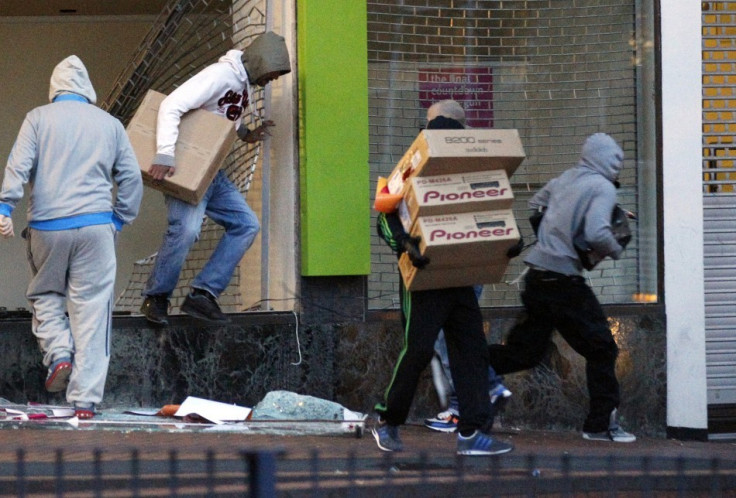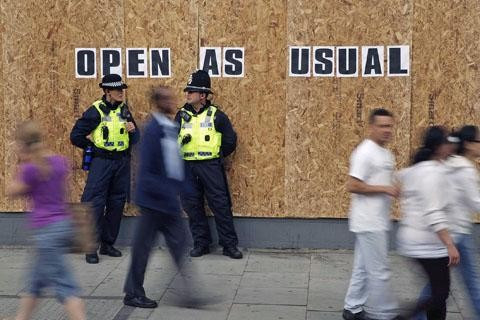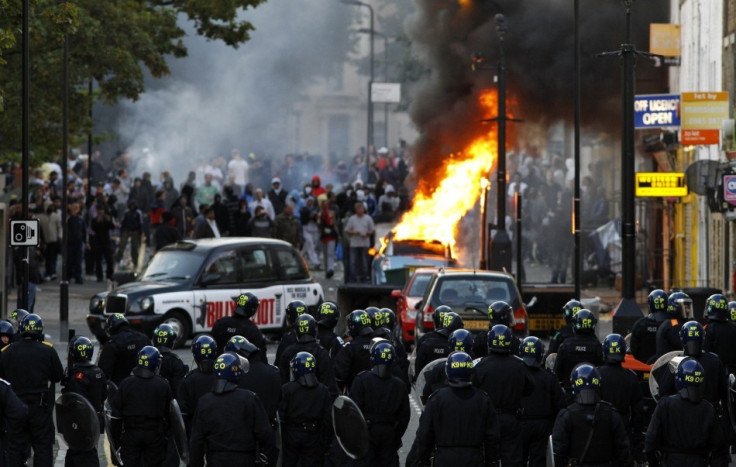Why the London Riots will Happen Again [ANALYSIS]
The riots that rippled out from London across English towns and cities in August 2011 sparked a nationwide debate over their causes and the nature of youth culture in the UK today. But as the first anniversary of the riots passes, we still have not correctly answered those difficult questions that led to our children engaging in mass violence, theft, arson and destruction.
Without a correct assessment or solutions, the destruction will happen again. Unlike riots that erupt from poverty, civil war or inequality, the 2011 English riots came from a far more complex sociological situation.
Let's go right back to the beginning.

Death of Mark Duggan
Mark Duggan, 29, was shot when his taxi was stopped in Tottenham, north London, by armed Met Police officers investigating gun crime. One year on, the family and the public have not been given the details as to why 31 police officers surrounded him and shot him twice in the chest.
An inquest is set to take place in January. Police previously said they believed Duggan was involved in drug dealing and claimed he was armed at the time of the shooting. Reports across the media said police believed he was a well-known gangster and a founding member of a notorious gang in Tottenham's Broadwater Farm Estate.
His family dispute this.
Without investigation details, more and more questions have arisen over the use of firearms. An internal police investigation has shown that a bullet lodged in a police radio was not fired by Duggan. The firearms officers involved have refused to be interviewed by investigators.
One year ago, the lack of detail and a sense of injustice felt by family members and locals sparked - at first - a peaceful protest. But it quickly escalated into wide-scale arson, violence and looting.
Answers are needed and transparency is paramount in order to pinpoint the trigger of Duggan's death to prevent more rioting.
It is possible that some evidence about police operations, included within the January investigation, will need to be heard in secret. To avoid accusations of a lack of full transparency there could be a special type of public inquiry.
While the mystery around the death of Duggan was no doubt a trigger, other core answers are needed in addressing an uncomfortable trend that has developed in the UK around British youth.

Wrong economic argument
After the peaceful protest in Tottenham, the streets filled with masked and unmasked youths smashing windows, setting fire to business premises, looting, and burning cars.
I doubt, judging by the three days of violence that ensued, subsequent interviews and statements through social media et al and in court hearings, that most of those involved even knew why the riots began.
What was meant to be about the death of Duggan turned into a violent free-for-all that led to 3,051 people appearing before UK courts on charges of looting, violence and arson which resulted in 2,500 shops and business being attacked, alongside 230 private homes.
Social commentators immediately remarked that it was disillusioned youth that had been let down by the state and how they felt oppressed by the wider political powers, heavy-handed policing and a lack of jobs because of economic depression.
The social commentary was reminiscent of the voice used by media pundits when protests erupted against dictatorships and corruption in countries where people were dying in poverty or displaced.
This, however, was north London.
The flaw in trying to resolve what went wrong across English cities last year was, and is, the failure to admit that the London riots cannot and should not be compared to the Arab Spring nor the 1984-5 miners' strike.
Over the years we have raised the bar for how the UK defines poverty. While I am not deluded enough to believe that there is no such thing as a family going hungry in the UK or that our culture is to blame for producing feral youth, real poverty is something else.
Regardless of what government we have, we can still receive state welfare for housing, food and energy bills to keep us functioning. Life is not easy for those on the breadline, especially for a family, but there are very basic safeguards in place.
On top of that, we have free education up to the age of 18 and we have a public health service that means no matter what, you will be able to have healthcare regardless of who you are, where you come from or what your salary is.
Like the rest of the world, the economy is painfully strained. The UK has entered a double-dip recession and the future looks bleak for everyone - not just the nation's youth.
The UK has, however, garnered a culture of having the right to what we want - and quickly. The riots turned into a feeding frenzy for sporting goods and looters proudly posted online their stolen wares which ranged from store brand rice to moisturiser to electronic good and trainers.
One of the most famous cases included the 23-year-old student who had no previous convictions but was jailed for the maximum permitted six months after pleading guilty to stealing bottles of water worth £3.50 from discount store Lidl.
Many looters, note I have stopped calling them rioters, proclaimed in court that they just got "swept up" in the frenzy. "Everyone else was doing it," they said. Many younger looters/arsonists, even said: "We are getting our tax money back."
In the UK, you can still be poor but gain access to satellite television, have the latest electronic goods, designer clothes and even cutting-edge technology if you want it on credit.
And here's where the real economic unrest lies.

Money for nothing
It is not about necessarily the bleak outlook for the country or the lack of jobs - we have gone through peaks and troughs every 20 years or so like this - but more towards the attitude towards debt.
In tandem, we only have to look explosion of celebrity and tabloid fodder that drums riches and fame into the subconscious. In many cases the rewards come from easy money that requires no education or graft.
An online survey of almost 1000 girls aged 15-19 found that 63 percent considered "glamour model" and 25 percent "lap dancer" their ideal profession from a list of choices including a teacher and doctor.
Maybe that will also explain why even with our state-funded education that allows a child to leave school with two sets of qualifications, the UK still has diabolically high truancy rates and rising levels of 16-18-year-olds not in education, employment or training.
Multiple years' worth of borrowing money, even through the "good times", has meant that outstanding personal debt stands at £1.458tn as of the end of June 2012.
According to debt statistics by money education charity Credit Action, every day in the UK 314 people are declared insolvent or bankrupt every day.
Credit was easier to obtain before the economic crisis, which arguably was fuelled by individuals who could get 100% mortgages and loans, even without a job or a good credit history.
We have been conditioned to borrow and spend well beyond our means and when that pool of money dries up - it seems like injustice.
The rioters-turned-looters did not steal food to feed their families. They took trainers, phones and designer clothes.

Contagion and consequence
After the London riots swept across the capital, news that they had not been contained spread north to Manchester and Birmingham.
While the initial peaceful protest over Duggan's death was the catalyst for events, the message of injustice was lost.
Through BlackBerry messaging services, Twitter and other social media sites that allow anonymity, word went out that the police were either absent or failing to stop the riots.
This led to the violence spreading quickly from north to south London and then to Manchester and Birmingham and other major conurbations. Constant remarks about the lack of police control reinforced the message that there would be no consequences.
The jail sentences and fines that followed were in some cases extremely heavy in relation to the crimes as a way of reinforcing the message of punishment.
But social unrest can never be fixed so quickly.
Going back to the core of youth punishment, Anti-Social Behaviour Orders - Asbos - have done more harm than good in teaching the under-18s about taking responsibility.
Originally issued to correct minor incidents that would not ordinarily warrant criminal prosecution, Asbos in a way taught a large demographic that most of the time nothing consequential would come out breaking the law.
When they were introduced in 1998, Asbos were seen as a good way of punishing minor infringements without giving the perpetrator a criminal record.
In 2006, the National Audit Office reported that over half of those with Asbos breached them anyway. One person had done so 25 times, although the average number of breaches was four per person.
"The system [is] setting people up to breach the Asbo," said Matt Foot, coordinator of Asbo Concern.
"They go into prison. They come out. They breach it again. And that is what's happening in this country - we have five to 10 young people every week going into custody for breach of Asbos. It's an extremely expensive process."
The top three districts with the highest number of Asbos were Greater Manchester at 1,237, Greater London at 1,172 and the West Midlands at 787 - all regions that were ruptured by the riots.
This number has not dropped over the last few years.
Official figures also showed that the breach rate among 12-14-year-olds reached 73 percent, further highlighting the lack of regard for committing at least a minor offence.
This is one of the more sticky subjects that many commentators are scared of addressing. While many of the acts in the city riots were inexcusable, we still have to knuckle down and really address the environment we raise our young in.
© Copyright IBTimes 2025. All rights reserved.






















